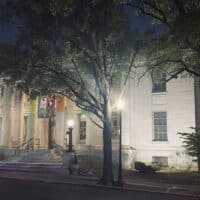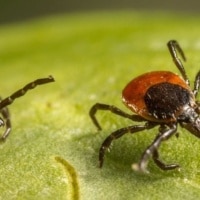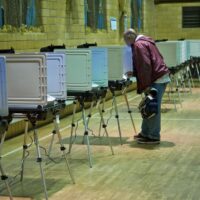Thursday’s coronavirus numbers were mixed, but Gov. Andy Beshear kept accentuating the positive, saying he sees the impact of his July 9 order requiring Kentuckians to wear masks in indoor public spaces and outdoors when they can’t stay six feet apart.

“It appears that face coverings are making a difference,” Beshear said as he announced 659 new cases of the virus, raising the seven-day rolling average by seven, to 612.
“We believe what we are generally seeing is a leveling off or at least a significant decrease in the escalation” that began in early July, he said.
The day’s good number was 5.66 percent, the share of Kentuckians testing positive for the virus in the last seven days. Wednesday’s seven-day percentage was 5.81.
Noting weekly figures, he said, “We at least stopped the significant escalation in that last week we’re showing, and we believe we are going to be somewhere in that zone at the end of this week.”
Beshear said the state remains in “a danger zone, but again with the time to do things right.” In a new suggestion, he said businesses could help by letting more of their employees work from home.
“I think the further that we’ve gotten into this virus, the more people have tried to pull 100 percent of their employees back in the office, and that doesn’t help,” he said, adding later that he had heard, anecdotally, that many workplaces are operating at 100%. “I would still really suggest people stay down around 50%,” he said. “If people are productive virtually, don’t mess with their production.”
Contact tracing: The July surge did not overwhelmed the state’s contact tracers, the employees who call people who have had contact with those who have tested positive for the virus, said Mark Carter, the official overseeing the program.
Carter said 70% to 75% of those contacted are cooperative when asked to self-quarantine. “They want to protect their health, they want to protect their loved ones,” he said. “Certainly, there are those that are uncooperative, but so far those have been far in the minority.”
He said more cases could overwhelm the program, so it’s important to recognize it as one measure of the state’s response to the pandemic. He suggested that its big test will come when students return to classrooms. “Indoor settings are an issue,” he said, “and as we look at school returning, whenever that happens, that is of significant concern to us.”
In other COVID-19 news Thursday:
- The state reported seven more deaths from covid-19, raising its toll to 731. The fatalities were a 75-year-old man from Casey County; a 65-year-old man from Christian County; a 92-year-old woman from Green County; an 82-year-old man from Greenup County; an 81-year-old woman from Ohio County; a 63-year-old woman from Simpson County; and a 70-year-old woman from Warren County.
- Counties with more than 10 new cases were Jefferson,138; Fayette, 42; Warren, 22; Laurel, 20; Hardin, 18; Shelby, 17; Graves and Henderson, 15 each; Christian and Daviess, 14 each; Kenton and Mercer, 13 each; Barren, Oldham and Scott, 12 each; and Franklin and Pulaski, 11 each. Beshear said Thursday’s 659 new cases included 22 children under 5.
- In long-term care facilities, 12 more residents and 18 more employees tested positive for the virus, but no new deaths were attributed to the facilities. Five more facilities were added to the list of those with a least one case, raising the total to 253.
- The governor cast some doubt on the Sept. 5 Kentucky Derby, to be held at 60% spectator capacity, when asked if he would go if it were held now. “I think everybody wants us to see improvements on where our numbers are,” and if the recent escalation continued, “I would have to think long and hard before really going anywhere and that’s about a decision for me and my family,” he said. “If the numbers are still where they are right now in September, that means we’ve done a great job plateauing them, and if that’s the case I probably would go and hand out that trophy.” He said he hopes Churchill Downs is continuing to find ways to make the event safer.
- Asked abut the state fair, set for Aug. 20-30, he said the Department for Public Health “sent an additional series of recommendations … for them to consider in light of where we are right now. And remember, anything that is held out there or anywhere else around Kentucky that is large, if not done well, can ultimately upset other opportunities to do large events.” He said he did not know what the agency’s recommendations were.
(Kentucky Health News is an independent news service of the Institute for Rural Journalism and Community Issues, based in the School of Journalism and Media at the University of Kentucky, with support from the Foundation for a Healthy Kentucky.)





